|
|
|
Sort Order |
|
|
|
Items / Page
|
|
|
|
|
|
|
| Srl | Item |
| 1 |
ID:
154338
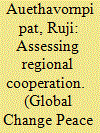

|
|
|
|
|
| Summary/Abstract |
Existing studies of Association of Southeast Asian Nations (ASEAN) states’ engagement with migrant worker rights focus on the experience of such workers from gender, labour and security perspectives. As such, these studies are yet to consider the broader impact of migrant worker rights on the process and nature of cooperation between ASEAN members. This article addresses this gap by framing migrant worker rights within the broader human rights socialization ongoing within Southeast Asia, driven by both members of ASEAN and external stakeholders. It argues that, contrary to many existing accounts of norms as creating shared commitments, migrant worker rights have led to considerable contestation, often driven by diverging national approaches to the issue. This article examines the impact of migrant worker rights norms on Thailand, the largest labour-recipient state in ASEAN. It asserts that Thailand’s diverging experience is caused by the lack of norm precision, resulting in the applicatory contestation of such norms.
|
|
|
|
|
|
|
|
|
|
|
|
|
|
|
|
| 2 |
ID:
154342
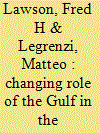

|
|
|
|
|
| Summary/Abstract |
In the past half-decade, the role of the Gulf in the international political economy has changed dramatically. The region’s position as a supplier of world hydrocarbons has slipped, even as local consumption of oil and gas continues to expand. Gulf investments have shifted from the industrialized countries to the Middle East and North Africa. Saudi Arabia no longer exercises disproportionate influence in the Group of 20. Finally, relations with the People’s Republic of China and India have become truly interdependent, which gives the Gulf the capacity to exercise leverage over these two rising powers, despite its diminished position in global affairs.
|
|
|
|
|
|
|
|
|
|
|
|
|
|
|
|
| 3 |
ID:
154339
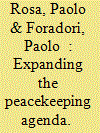

|
|
|
|
|
| Summary/Abstract |
This article aims to explain the emergence and assess the politico-military significance of ‘cultural peacekeeping’ (CPK) as a new task for international peace operations. The aim is to provide a conceptual appraisal of CPK and an initial insight into its objectives, opportunities and challenges. The analysis supports the inclusion of a cultural component in the mandates of peacekeeping interventions, even if we must be wary of the inherent difficulties and risk of unintended consequences. These are not to be underestimated, at the risk not only of failing to achieve the mission’s objectives but also of further deteriorating security on the ground and beyond. It follows that CPK should not be mistaken, nor presented to the public, as a minor, light, and inexpensive operation. Quite to the contrary, it is an extremely complex and politically very sensitive politico-military major exercise that needs careful planning and adequate capabilities. Misunderstanding or mismanaging CPK can severely backfire. It is a ‘double-edged weapon’ that must be handled cautiously to avoid the risk of the enemy manipulating it to its own advantage.
|
|
|
|
|
|
|
|
|
|
|
|
|
|
|
|
| 4 |
ID:
154341
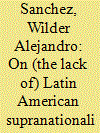

|
|
|
|
|
| Summary/Abstract |
This commentary discusses the state of supranationalism in Latin America. We will enumerate the numerous regional organizations in the Western Hemisphere, and also discuss their successes and failures at regional integration. While integration has had some successes, supranationalism has yet to flourish among Latin American states and it will probably not for the immediate future. Empirical evidence suggests that, while inter-state warfare is scarce in the region, there are still too many inter-state tensions, including ongoing border disputes, as well as occasional incidents, which prevent supranationalism from taking hold. This explains the lack of a North Atlantic Treaty Organization-esque type South American bloc. Nevertheless, small-scale integration projects have been successful, like visa waivers systems, educational programs or defense-cooperation projects. Ultimately, in a changing global geopolitical system, the distrust for supranationalism remains the same in Latin America.
|
|
|
|
|
|
|
|
|
|
|
|
|
|
|
|
| 5 |
ID:
154337


|
|
|
|
|
| Summary/Abstract |
Resilience is a widely used concept among development, environmental, security and peacebuilding organizations. However, resilience has rarely been applied in conjunction with the potentially complementary concept of environmental security. Therefore, this paper explores how the concepts of resilience and environmental security can be jointly applied by non-governmental organizations working to implement peacebuilding projects in developing countries. We first review definitions of the concepts and explore their strengths and pitfalls. Second, we develop a conceptual framework for a joint application whereby environmental security sharpens the scope of resilience, while resilience allows for taking issues into account that a traditional environmental security perspective might miss. Finally, we apply the conceptual framework to a case study from Palestine.
|
|
|
|
|
|
|
|
|
|
|
|
|
|
|
|
| 6 |
ID:
154340
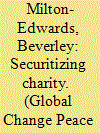

|
|
|
|
|
| Summary/Abstract |
In this article, the argument is offered that securitization of the Palestinian zakat committees became a weapon in the counter-terror arsenal of Israel and the Palestinian Authority (PA) as each sought to exert hegemony over what became framed as a ‘common enemy.’ The article extends the debate as it relates to the increasingly hostile response by state actors and the international community to the work of non- and semi-governmental Muslim charitable actors evidenced by proscription regimes, financial investigation, and prosecutions. Focusing on the example of Israel and the PA, it is contended that the securitization of Palestinian zakat committees was part of a wider policy to inhibit Palestinian autonomy and portray Islamic faith agency as terroristic. Both Israel and the PA, as governing powers, have engaged in attempts to undermine Palestinian zakat committees and their contribution to welfare and humanitarian support in the complex and enduring environment of conflict.
|
|
|
|
|
|
|
|
|
|
|
|
|
|
|
|
|
|
|
|
|